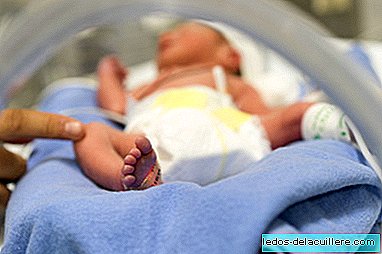
Today, November 17, the World Premature Day, babies who have come to the world too soon. Every year 15 million premature babies are born in the world, which represents one in 10 births.
In Spain, the number of children born before the 37th week of gestation has increased by 36% between 1996 and 2013, according to the latest official figures from the National Statistics Institute (INE). With 28,000 babies born prematurely a year, equivalent to one in 13, Spain is one of the European countries with the highest preterm birth rate.
We all know in our environment a child born before term, to a lesser or greater degree. Babies born in preterm birth, the one that occurs before the 37th week of gestation, which due to their immaturity are exposed to major complications, such as respiratory distress, infections, eating disorders, and who may need special care admitted to the hospital.
A public health problem
Although there are no concrete causes, in our country science points to several factors that favor prematurity: assisted reproduction techniques, multiple births, work stress, health problems in the mother and the delay of maternity. In less developed countries, on the contrary, prematurity is due to lack of medical follow-up during pregnancy, childbirth and postpartum.
Thanks to medical advances, more and more premature babies get ahead, especially the group of extreme premature babies, those who arrive in the world between the 22nd and 28th week of gestation.
But the more premature the birth, the more likely it is that it can cause health problems for the newborn, and the babies at birth before the 32nd week of gestation are the most at risk (approximately 20% of all premature births ).
Premature infants star in three out of four hospital admissions of newborns, according to the Spanish Society of Neonatology (SENeo). Among the main complications they face are an increased risk of cerebral palsy, sensory deficits, chronic diseases or acute respiratory infections, especially bronchiolitis caused by Respiratory Syncytial Virus (RSV), a disease that affects 100,000 children under 2 years a year .
Between 0.5% and 2% of those affected are hospitalized, although the hospitalization rate reaches 13% in children considered high risk as the premature ones, arriving in the Neonatal Intensive Care Units (NICU) up to 20% of the premature babies between 33-35 weeks of gestational age.
“Prematurity is a public health problem with health, educational and socio-family implications,” Cristina Maroto Centeno, president of the Association of Parents of Premature Children (APREM)Little big fighters

The birth of a premature baby baffles the whole family. When your baby is born premature and nothing is as expected, you face a new situation in which every day counts for the survival of the baby. Seeing him so fragile and tiny awakens feelings that are difficult to manage, but at the same time you want to be there to take care of him and give him all the strength he needs.
The Kangaroo Method has proven to have great benefits in these little great heroes. Inspired by the marsupials that are born immature and continue their growth outside the uterus, it consists in keeping the baby in skin-to-skin contact, as if it were a human incubator. It contributes, among other things, to improving the regulation of vital signs, reducing the stress of interventions, and facilitating breastfeeding, a fundamental food for the care of premature babies.












